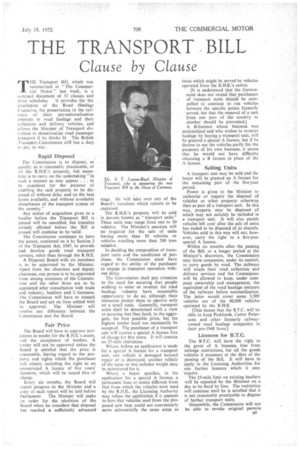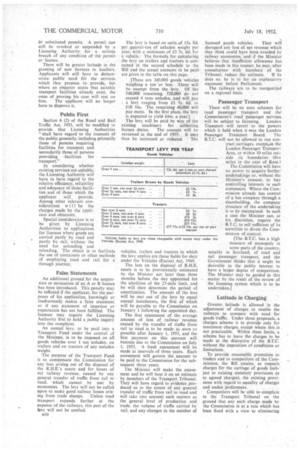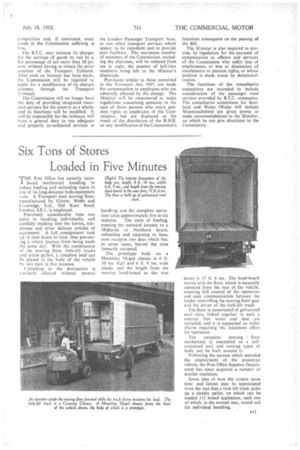THE TRANSPORT BILL
Page 43

Page 44

Page 45

If you've noticed an error in this article please click here to report it so we can fix it.
Clause by Clause
THE Transport Bill, which was summarized in The Commercial Motor" last week, is a compact document of 33 clauses and
three schedules. It provides for the dissolution of the Road Haulage Executive, the preservation to the railways of their pre-nationalization interests in road haulage' and their collection and delivery vehicles, and a:lows the Minister of Transport discretion to denationalize road passenger transport if he thinks fit. The British Transport.Commission still has a duty to pay its way.
Rapid Disposal
The Commission is to dispose, as quickly as is reasonably practicable, of all the R.H.E.'s property, but meantime is to carry on the undertaking "in such a manner as may appear . . . to be expedient for the purpose Of enabling the said property to be disposed of without delay and on the best terms available, and without avoidable disturbance of the transport • system of the country." • Any notice of acquisition given to a haulier before the Transport Bill is passed will be cancelled, but transfers already effected before the Bill is passed will continue to be -valid.
The Commission continues to have the power, conferred on it by Section 2 of the Transport Act, 1947, to provide and develop goods road transport services, other than through the R.H.E.
A Disposal Board with six members is to be appointed by the Minister. Apart from the chairman and deputy chairman, one person is to be appointed from among nominees of the Commission and the other three are to be appointed after consultation with trade and industry, hauliers and C-licensees. The Commission will have., to consult the Board and act on lines settled with its approval. • The Minister will resolve any difference between the Commission and the Board.
Fair Price
The Board will have to approve invitations to tender for the R.H.E.'s assets, and the acceptance of tenders. A tender will not be approved unless the Board is satisfied that the price is reasonable, having regard to the property and rights which the, purchaser will obtain, including the right to an unrestricted A licence of five years' duration, which will be issued free of charge.
Every six months, the Board will report progress to the Minister and a copy of each report will be laid before Parliament. The Minister will make an order for the abolition of the Hoard when he considers that disposal has reached a sufficiently advanced
stage. He will take over any of the Board's functions which remain to be exercised.
The R.H.E.'s property will be sold in parcels known as "transport units." These units may range from one to SO vehicles. The Minister's sanction will be required for the sale of units having more than 50 vehicles or vehicles totalling more than 200 tons unladen.
In deciding the composition of transport units and the conditions of purchase, the Commission must have regard to the ability of the purchaser to engage in transport operation without delay.
'The Commission shall pay attention to the need for securing that people wishing to enter or re-enter the road haulage industry have reasonable opportunity to do so, although their resources permit them to operate only on a small scale. Generally, transport units shall be determined with a view to securing that they fetch, in the aggregate, the best possible price, but the highest tender need not necessarily be accepted. The purchaser of a transport Unit will receive a special A licence free of charge for five years. It will contain no 25-mile restriction.
Where, before an application is made for a special A licence for a transport unit, any vehicle is damaged beyond repair or is destroyed, another vehicle of the same or less unladen weight may be substituted for it.
Where a buyer specifies, in his application for a special A licence, a permanent base or centre different from that from which the vehicles were used by the R.1-LE., the Licensing Authority may refuse the application if it appears to him that vehicles used from the proposed new base could not conveniently serve substantially the same areas as those which might be served by vehicles operated from the R.H.E.'s centre.
[It is understood that the Government does not intend that purchasers of transport units should be compelled to continue to run vehicles between the specific points formerly served, but that the removal of a unit from one part of the country to another should be prevented.]
A B-licensee whose business was nationalized and who wishes to re-enter haulage by buying a transport unit, will be'granted a special A licence, but if he desires to use the vehicles partly for the purposes of his own business, it seems that he would not have difficulty obtaining a B licence in place of the A licence.
Selling Units
A transport unit may be sold and the buyer will be granted an A licence for the remaining part of the five-year period.
Power is given to the Minister to authorize or require the disposal of vehicles or other property otherwise than as part of a transport unit. In this way, property may be disposed of which may not suitably be included in a transport unit. It will also enable vehicles left over after the sale of units has ended to be disposed of ds chattels. Vehicles sold in this way will not, however, carry the right to a five-year special A licence.
Within six months after the passing of the Bill, or a longer period at the Minister's discretion, the Commission may form companies, under its control, to carry goods by road. The railways will retain their road collection and delivery services and the Commission will be allowed to keep, under company ownership and management, the equivalent of the road haulage interests of the railways before nationalization. The latter would cover some 3,500 vehicles out of the 40,000 vehicles operated by the R.H.E.
[This means that the B.T.C. will be able to keep Pickfords, Carter Patersons and other formerly railwayowned road haulage companies in their pre-1948 form.]
Licences for B.T.C.
The B.T.C. will have the right to the grant of A licences, free from mileage restrictions, for all the goods vehicles it possesses at the date of the passing of the Bill. It will have to apply to the Licensing Authorities for any further licences which it may 'require.
The 25-mile limit on existing hauliers will be repealed by the Minister on a day to be fixed by him. The restriction will continue until he is satisfied that it is not reasonably practicable to dispose of further transport units.
Meanwhile, the Commission will not be able to revoke original permits 59 i5r substituted permits. A permit can still be revoked or suspended by a Licensing Authority for a serious breach of any condition of the permit or licence.
There will be greater latitude in the granting of new licences to hauliers. Applicants will still have to demonstrate public need fOr the services which they propose to provide, but where an objector states that suitable transport facilities already exist, the onus of proving his case will rest on him. The applicant will no longer have to disprove it.
Public First
Section 6 (2) of the Road and Rail Traffic Act, 1933, will be modified to provide that Licensing Authorities "shall have regard to the interests of the public generally, including primarily those of persons requiring facilities for transport and secondarily those of persons providing .facilities for transport."
In considering whether existing services are suitable, the Licensing Authority will have to have regard to the relative efficiency, reliability and adequacy of those facilities and of those which the applicant will provide. Among other relevant considerations will be the charges made by the applicant and objectors.
Special consideration is to be given by Licensing Authorities to applications for licences where goods are carried partly by. road and partly by rail; without the need for unloading and reloading. The object is to facilitate the use of containers or other methods of employing road and rail for a through journey.
False Statements
An additional ground for the suspension or revocation of an A or B licence has been introduced. This penalty may be inflicted if the applicant, for the purposes of his application, knowingly or inadvertently makes a false statement or if any statement of intention or expectation has not been fulfilled. The licensee may require the Licensing Authority first to hold a public inquiry into the complaint.
An annual levy, to be paid into a Transport Fund under the control of the Minister, is to be imposed on all goods vehicles over I ton unladen, on trailers and on tractors of any unladen weight.
The purpose of the Transport Fund is to compensate the Commission for any loss arising out of the disposal of the R.H.E.'s assets and for losses of net railway revenue, caused by any general transfer of traffic from rail to road; which cannot be met by economies. The levy will not be called upon to make good railway losses aris ing from trade slumps. Unless road transport expands further at the expense of the railways, this part of the levy will not be applied.
B 10 The levy is based on units of 13s. '6(1. per quarter-ton of unladen weight per year, with a minimum of £3 7s. 6d. for a vehicle. The formula for calculating the levy on trailers and tractors is contained in the second schedule to the Bill and the actual amounts to be. paid are given in the table on this page.
[There arc 340,000 goods vehicles weighing a ton or less. These will be exempt from the levy. Of the 560,000 remaining, 520,000 do not exceed 4 tons unladen, and will pay a levy ranging from £3 7s. 6d. to £10 16s. The remaining 40,000 will pay more. In the first place, the levy is expected to yield £4m. a year.]
The levy, will be paid by way of the existing machinery for collecting licence duties. The amount will he reviewed at the end of 1955. It may then be increased or reduced. The vehicles, trailers and tractors to which the levy applies are those liable for duty under the Vehicles (Excise) Act, 1949.
The loss on the disposal of R.H.E. assets is to be provisionally estimated by the Minister not later than three months before the day appointed for the abolition a the 25-mile limit, and he will then determine the period of amortization. The amount of .the loss will be met out of the levy by equal annual instalments, the first of which will be payable to the Commission on January 1 following the appointed day. The first assessment of the average amount of loss of railway revenue caused by the transfer of traffic from rail to road is to be made as soon as possible after January 1, 1955, and the first payment on this account will become due to the Commission on July 1, 1955. A fresh assessment will be made at intervals of three years. Each assessment will govern the amount to be paid to the Commission for the subsequent three years.
The Minister will make the assessment and he will base it on an estimate by members of the Transport Tribunal. They will have regard to evidence.produced as to the extent of any general transfer of traffic from rail to road and will take into account such matters as the general level of production and, trade, the volume of traffic carried by rail, and any changes in the number of
licensed goods vehicles. They will disregard any loss of net revenue which they think could have been avoided by railway economies, an if the Minister believes that insufficient allowance has been Made in this respect, he may,•after consultation with members of the Tribunal, reduce the estimate. If 'he does so, he is to lay an explanatory statement before Parliament.
The railways are to be reorganized on a regional basis.
Passenger Transport
There will be no area schemes for road passenger transport and the Commission's road passenger services
will be subject to licensing. London Transport will revert to the powers which it held when it ,was the London Passenger Transport Board. The B.T.C. will not he allowed to run contract carriages, except in the London Passenger Transport Area, or within 10 miles outside its boundaries (five miles in the case of Kent.)
The Commission will have no power to acquire further undertakings or, without the Minister's consent, to buy controlling interests in such companies. Where the Commission already has control of a bus company through a shareholding, the company structure of the undertaking is to be maintained. In such a case the Minister can, at his discretion, require the B.T.C. to sell sufficient of its securities to divest the Commission of control.
under the [The B.T.C. has a high
measure of monopoly in some parts of the country, notably in Scotland, of road and rail passenger transport, and the Government thinks that it might be desirable in the public interest to have a larger degree of competition. The Minister may be guided in this matter by the result of the review of the licensing system which is to he undertaken.]
Latitude in Charging
Greater latitude is allowed in the adjustment of charges to enable the railways to compete with road for goods traffic. Under these proposals, a charges scheme is to provide only for maximum charges, except where this is not practicable. Within these limits, a scheme has to leave the charges to be made at the discretion of the B.T.C. without the imposition of .conditions or limitations. .
To provide reasonable protection. to traders and to competitors of the Commission, the Bill retains, as respects charges for the carriage of goods (subject to existing statutory provisions as to agreed charges), the 'existing provisions with regard to equality of charges and undue Preferences.
• Competitors will be able tocomplain to the Transport Tribunal on the ground that 'any such charge made by the Commission is at a rate which has been fixed with a view to eliminating competition and, if continued, must result in the Commission suffering a loss.
The B.T.C. may increase its charges for the carriage of goods by rail by a fiat percentage of not more than 10 per cent, without having to obtain The prior sanction of the Transport Tribunal. After such an increase has been made, the Commission will be required to apply for a modification of its charges schemes through the Transport' Tribunal.
The Commission will no longer have the duty of providing integrated transport services for the country as a whole, and its functions will be modified. It will be responsible for the railways, will have a general duty to run adequate and properly co-ordinated services in the London Passenger Transport Area, to run other transport services which appear to be expedient and to provide port facilities. The maximum number of members of the Commission, exchading the chairman, will be reduced from ten to eight, the number of full-time members being left to the Minister's discretion.
Provisions similar to those contained in the Transport Act, 1947, are made for compensation to employees who are adversely affected by the change. The Minister will be empowered to make regulations concerning pensions in the case of those persons who enjoy pension rights as employees of the Commission, but are displaced as the result of the dissolution of the R.H.E. or any modification of the Commission's functions consequent on the passtng of the Bill.
The Minister is also required to provide, by regulation, for the payment of compensation to officers and servants of the Commission who suffer loss of employment, or loss or diminution of emoluments or pension rights, or whose position is made worse by denationalization.
The functions of the consultative committees are extended to include consideration of the passenger road services provided by B.T.C. companies. The consultative committees for Scotland and Wales (Wales will include Monmouthshire) are given power to make recommendations to the Minister, on which he can give directions to the Commission.




























































































